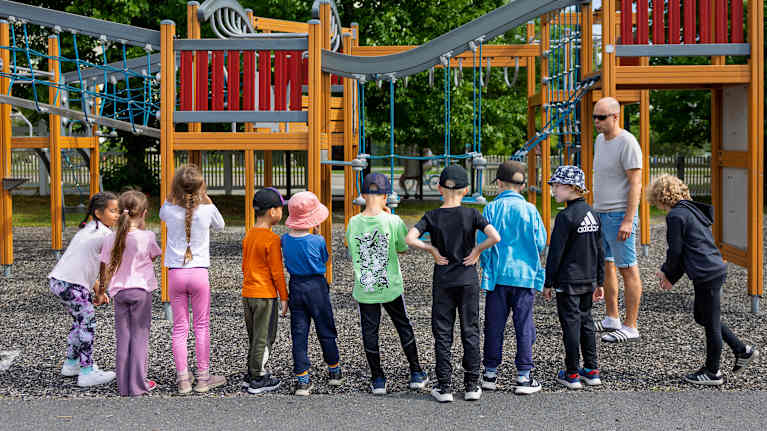Education minister Anders Adlercreutz (SPP) announced earlier this week that he wants Finnish schools to start their summer holidays in the middle of June — instead of at the very beginning of the month, as they currently do.
Adlercreutz first floated the idea of a delayed start to the summer holidays earlier this year, telling Yle at the time that the idea was “definitely something worth considering” as his ministry was investigating the feasibility.
In a press release on Monday, the minister argued that such a move would be a win-win for Finnish businesses — in particular those operating in the tourism and hospitality sectors — as well as for Finnish families.
“Because a large part of European tourism takes place in August, this is a challenge that has direct consequences for our businesses — how can we attract tourists to Finland if domestic demand ends when schools start, which of course affects the availability of services,” Adlercreutz wrote.
A survey published in March by the Finnish Hospitality Association (MaRa) and the Service Sector Union PAM showed there is support for his view, with 57 percent of respondents saying they were in favour of the idea.
Adlercreutz further noted that Finland is currently out of sync with the rest of Europe — including Nordic neighbours Sweden and Norway — all of which keep kids in classrooms until around the middle of June.
In Finland, however, the custom of closing the school doors in the first week of the summer isn’t just a tradition — it has been written into Finnish law since 1920 that the school year must conclude by week 22.
The Swedish People’s Party leader wrote on Monday that Finland’s century-old summer holiday schedule is “from the past” and should be aligned with its near neighbours as well as the rest of Europe.

Open image viewer
Finland’s education minister Anders Adlercreutz of the Swedish People’s Party. Image: Roni Rekomaa / LehtikuvaA solution that creates different problems?
Daniel Beech, a father-of-three originally from Colchester in England but living in Helsinki for over 20 years, told Yle News that the Education Minister’s proposal will not ‘solve’ the childcare challenges parents face in June — but will merely move them to later in the summer.
The school summer holiday will still be about 9-10 weeks long, he noted, while parents have much less vacation time.
“The biggest problem I find in this country is that you can never have a holiday with your partner while the kids are young and in school. You’ve got to have separate holidays, so one has four weeks, the other one has four weeks, and if you’re lucky enough to have grandparents or whatever around, they can maybe help out for the other couple of weeks,” he said.
In addition, Beech pointed out that scheduling school holidays to run from mid-June to mid-August, bringing Finland in line with other European countries, could have the unintended consequence of driving up flight and accommodation costs for families hoping to go on holiday.
This is especially pertinent for international families living in Finland, he added, as summer is often the only chance the children of such families get to spend significant time in their “other home” — meaning the country of their parent’s birth.
“I honestly don’t think this change will make any difference at all to anyone except it will be a bit more expensive to travel,” he said, noting further that “if the rest of Europe is on holiday as well, it’s just going to push up the prices of getting abroad”.
Instead, he suggests that Finland could delay the start of the summer holiday — as has been proposed — but instead of tacking the two weeks onto the end of the break, the saved vacation time could be distributed around the year.
“If we had an extra week at Christmas, and an extra week at Easter, like they do in the UK, for example, I think that would make more sense,” Beech said.
This point was echoed by other international parents Yle News spoke to, that a shorter summer holiday but longer breaks during the school year would be a better option.

Open image viewer
The education minister’s plans could see the school year extended into the middle of June. Image: Simo Pitkänen / YleLack of support for parents the real issue
Elisabeth Koskinen, meanwhile, told Yle News that the discussion around whether or not to move the school summer holidays overshadows the real problem — that there is a lack of support for parents, especially single parents, during the early summer when young kids are off school and need to be supervised.
She described this need to find a camp, club or daycare for her child as a “logistical nightmare”, with places often booked up months or even a year in advance, and the remaining options either too expensive or located over an hour away from where she lives.
“Just comparatively to all these social programmes that do exist to help out the common welfare, it was a shock that there is very little out there for single parents,” Koskinen said.
Anna Puusniekka, a parenting support expert at the Mannerheim League for Child Welfare (MLL), told Yle at the beginning of this summer that the need to find childcare solutions during the summer puts extra pressure on low-income and single-parent families in particular.
This problem of a lack of support is even further exacerbated if the parent has moved to Finland from abroad, and therefore might lack the support network they would have in their home country.
“It really is only me for my child,” Koskinen said. “I was told [by social services] that normally families get help from a grandparent or friend for the summer but I don’t have that type of support. Not everyone does.”
OAJ: Two-week change “massive impact” on entire system
One group that is firmly opposed to Minister Adlercreutz’s proposal is the nation’s teachers.
A survey carried out in the spring by Finland’s teachers’ trade union, the OAJ, found the vast majority of teachers (78 percent) were against the idea of shifting the start of the summer holidays to the middle of June.
OAJ’s Educational Policy Manager, Jaakko Salo, told Yle News that the move to a later summer vacation would have a “massive impact” on the entire education system — all the way to the university level.
“It’s because Finland’s education system, all the school levels, are intertwined. So if you move the summer breaks in basic education, that impacts on upper secondary schools and also the timetable of matriculation exams and then the selection of students to universities,” Salo pointed out.
“So it changes the timetable of the entire education system.”

Open image viewer
Jaakko Salo of the teachers’ union OAJ. Image: Benjamin Suomela / Yle
He added that teachers have told the union they are also concerned about the potential effect on the performance of pupils if the current spring semester were to be extended by two weeks.
“Teachers think that usually not a lot of learning happens at the end of the spring term because the pupils are very tired and the spring term feels longer than the autumn term,” Salo said, adding that extending the semester further into June could have a detrimental effect on students’ ability to focus.
He also called for an extensive study to be carried out on the potential impact of moving the summer vacation, but with a particular emphasis on the effect on children’s education.
“It’s confusing that the minister of education seems to be taking the point of view of tourism and business on this issue, when the minister of education should look into the impacts on education,” he said.
Political momentum begins to build
Despite opposition from teachers, and mixed reactions from parents, the political sands are slowly shifting in favour of a two-week delay to Finland’s school holidays.
News group Uutissuomalainen asked Finland’s nine parliamentary parties for their views on the issue, and in a poll published on Wednesday morning revealed that the leaders of the Centre Party, Movement Now and the Swedish People’s Party — that is education minister Anders Adlercreutz — all said they were in favour of the proposal.
The Social Democratic Party (SDP) were the only parliamentary party to say outright they oppose the move, citing the problems associated with extending the duration of the spring semester.
The other parties said they would support a further investigation into the effects of delaying the school summer holiday, but added that the emphasis must be on the needs of children and young people.
Minister Adlercreutz conceded on Monday, when he revealed his backing for the plan, that the proposed change is “a more complex issue than it might seem at first glance” — and noted he is open to ideas such as extending the Easter holiday.
He also said he hoped there would be enough political will to bring the change into effect during this government’s term in office, or by the summer of 2027.
